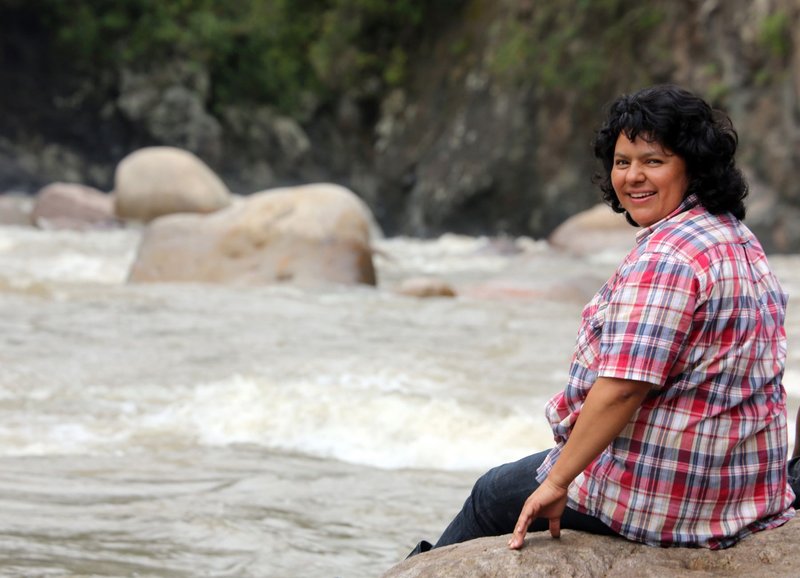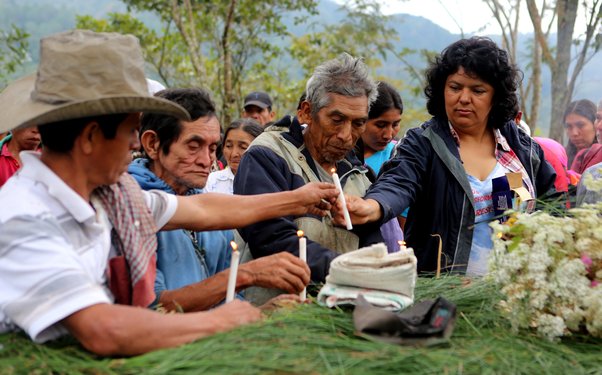Despite the international outcry that followed Berta’s murder, the Honduran government is consistently failing in its duty to protect its own citizens

In many parts of the world, standing up for the environment is a deadly undertaking. Few places are more dangerous than Honduras.
It’s been five years to the day that Honduran activist Berta Cáceres was assassinated for protecting her ancestral land from the construction of a hydroelectric dam. Yet Berta’s family are still seeking justice for her murder, and none of those who ordered the murder have been convicted.
Read our latest blog on Berta Cáceres’ legacy and the ongoing fight for justice for land and environmental defenders.
Despite the international outcry that followed Berta’s murder, the Honduran government is consistently failing in its duty to protect its own citizens. In fact, land and environmental defenders in the Central American state face more lethal and non-lethal threats today than they did in 2016.
On 2 March 2016, armed men broke into Berta’s home in the middle of the night and shot her dead. She had dedicated several years to protecting her community’s land in Intibucá, western Honduras, from the construction of the dam which threatened a vital and sacred water source for the indigenous Lenca people.
Less than a year before her death, Berta had delivered a moving address to a packed auditorium as she was presented with the 2015 Goldman Environmental Prize for exceptional bravery in environmental activism. She dedicated her award to “the martyrs who gave their lives in the struggle to defend our natural resources.” Berta said, “Mother Nature – militarised, fenced-in, poisoned – demands that we take action.” Unfortunately, not even international recognition could save her.
Two years ago, seven men were sentenced for their part in Berta’s murder. This was a rare outcome in a country where over 90% of human rights violations, including murders of defenders, go unpunished. It was only achieved thanks to the tireless pursuit of justice by Berta’s family and the organisation she co-founded, COPINH (the Civic Council of Popular and Indigenous Organisations of Honduras).
But COPINH argues that justice has not been served: the people that hired these convicted ‘triggermen’ – the intellectual authors of the crime – still walk free. The trial of the one person charged with ordering the killing has been delayed, and the proceedings have been shrouded in secrecy, denying the Cáceres family access to the process.
It is exactly this impunity from justice that is fuelling the high level of threats against land and environmental defenders in Honduras. And the situation is only getting worse. According to Global Witness data, at least 40 land and environmental defenders have been murdered in Honduras since Berta’s death. In reality, this number is likely to be much higher, as this data only accounts for attacks that are reported and verified. Even so, Honduras had the highest number of defenders murdered per capita in 2019.
Fatal attacks on activists are the tragic, sharp end of abuse. But we are also seeing a significant rise in instances of non-lethal violence and intimidation, wrongful detention, and the use and abuse of laws and policies designed to criminalise and intimidate defenders, their families and the communities they represent.
A recent report, which examined defenders around the world, found that Honduran human rights defenders faced the highest number of these threats. These tactics are employed to prevent people from speaking out. What’s more, they don’t make the headlines like killings do, rendering them all the more useful to those who want to crush dissent.
These are people that stand up to powerful vested interests in the mining, logging and agribusiness sectors. According to Global Witness data, indigenous groups have been particularly targeted – as businesses turn to extracting resources in evermore remote areas. Meanwhile, their government champions these interests with little regard for the wellbeing of its citizens.
This is part of a worrying global trend. As demand for products like timber, palm oil and minerals continues to grow, companies, governments and criminal gangs are routinely stealing land and trashing nature in pursuit of profit.
This trend is part of an epidemic that has been sweeping Honduras since a political coup in 2009, which itself has its roots in corporate greed, corruption, and impunity for business-backed aggressors. It shows a systematic campaign to terrorise local communities into accepting the theft and industrialisation of their land, and a profound failure to realise people’s rights to be consulted on the use of their natural resources.
Faced with the greatest danger, Berta only spoke louder for the rights of her community and the environment. The international community must honour her memory by calling for the Honduran government to protect environmental defenders. If they don’t hold offenders accountable, 2 March will continue to stand as a painful reminder of impunity for Hondurans and international allies – not just for Bertha, but an increasing number of our planet’s defenders.
Read this page in


